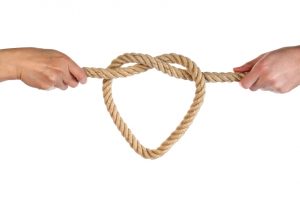Why Do People Have a Type?
 There’s a lot of mystery surrounding attraction. When we talk about our “type,” what pops into our head may be certain physical features or a number of positive qualities that seem totally reasonable to desire. Yet, there appear to be mysterious forces at play pushing us to choose certain people, and not all of these forces work to our benefit. Most of us have felt a spark with someone we knew wasn’t right for us. We may even notice a pattern of seemingly selecting people who are precisely wrong for us. Too often, we fail to acknowledge or even notice the less favorable qualities that are luring us toward certain choices, subtle characteristics that are drawing us in. Without knowing why, many of us aren’t just attracted to certain people despite their negative traits but because of them.
There’s a lot of mystery surrounding attraction. When we talk about our “type,” what pops into our head may be certain physical features or a number of positive qualities that seem totally reasonable to desire. Yet, there appear to be mysterious forces at play pushing us to choose certain people, and not all of these forces work to our benefit. Most of us have felt a spark with someone we knew wasn’t right for us. We may even notice a pattern of seemingly selecting people who are precisely wrong for us. Too often, we fail to acknowledge or even notice the less favorable qualities that are luring us toward certain choices, subtle characteristics that are drawing us in. Without knowing why, many of us aren’t just attracted to certain people despite their negative traits but because of them.
To understand why we’re drawn to the people we are, we have to understand a basic law of attraction: we choose people whose defenses fit with ours. If we protect ourselves by being quiet or withdrawn, we may choose partners who are more pursuing and aggressive. If we are insecure or clingy, we may choose partners who are aloof or less available – people who we have to chase. If our defense is to try to control everything around us, we may choose a partner who is passive and eager for guidance. In a sense, we fit with these people, not because their patterns perfectly complement ours, allowing us to get closer, but because the way our defenses line up actually sustains our individual defenses and serves to keep each of us at a certain, safe distance.
For those of us who wonder why we keep winding up with the same type of person or stuck in the same dynamic, the answer dates back to our earliest relationships. As young children, we developed defenses to cope with painful or frustrating circumstances. Growing up, we became wedded to our defenses, believing them to be part of our personality. If we formed negative ideas about ourselves, for instance that we’re unlovable or unattractive, we now seek out people whose behavior will support these beliefs. We choose romantic partners who reinforce familiar attitudes we’ve long had toward ourselves. You may think you were drawn to the aloof and mysterious guy, because he seemed deep and interesting, but ultimately, you may have been drawn in by his absence or inability to fully relate to you. You may not be able to stop thinking about that woman who demanded your attention all night, but it may actually have been her controlling attitude that won you over.
Our defenses informed the attachment patterns we developed as young children to get our needs met by our primary caregivers. These early attachment patterns became models for how we expected relationships to work in our adult lives. Therefore, if we felt rejected, ignored, intruded on, insecure, criticized, resented, or drained in our early life, we tend to seek out relationships that recreate that same emotional climate today. If, as kids, we felt our needs were often ignored or overlooked, we now feel drawn to people who are emotionally unavailable, noncommittal, even married to someone else. If we felt we had to take care of everyone in our household, we now seek partners we feel we have to rescue. If we felt rejected or unloved, we find people we have to convince to love us or who we have to “win over.”
The problem is we may not even like or want a relationship with someone with these qualities. They may not even sound appealing, and we may even ultimately feel driven a bit crazy by them. But, in truth, we are actually attracted to that feeling. On some deep, unconscious level, we feel we need someone with these precise qualities to survive, to heal our old wounds, to make us feel like our needs will be met. For example, if we feel a need to be taken care of, we may find someone who’s quick to take the reigns, wants to be the boss, and promises to take care of us. If we’re driven to take care of ourselves and don’t want to rely on anyone else, we may select people who are pseudo-independent, distant, and unavailable.
Our early attachment styles and the defenses and adaptations we form around them have a strong influence on the partners we choose in the present. In order to break any negative patterns of choosing the same partner, we have to consider, what are the not so great qualities I’m seemingly attracted to. What are the negative traits of my type? Think about the people you’ve dated and note any patterns or similarities between them. Don’t just think about the obvious comparisons but the more subtle aspects of how they treated you, how they made you feel about yourself. What characteristics did they seem to look for in you? Did they want you to take care of or control them? Did they pull away when you came toward them or react when things felt close?
Of course, when you first met there were probably a lot of obvious and sensible reasons you chose that person: sense of humor, sensitivity, an amazing smile, or a great laugh. Try to think about if there were any less obvious qualities that drew you to these people or deepened your attraction to them. Was it a faraway look in their eyes? An initial disinterest? Did they pursue you aggressively? Did they fawn over you or build you up? As you do this, you may be able to start making connections to your past. Do any of these relationship dynamics or feelings seem familiar? Do they remind you of anything or anyone from your early life?
As we come to know our patterns, we can start to make different choices about who we date. This may involve making some decisions that are initially uncomfortable but that will ultimately make us happy. We may have to date outside our comfort zone, pushing through the trials of getting close to a person who challenges our defenses. If we feel easily overwhelmed, like someone will want too much from us, we may have to stick it out with that person who outwardly shows affection. If we feel like we need to go after someone or they’ll never show any interest, we may have to wait for that person at a party who approaches us instead of vice versa.
These old patterns of defending ourselves can steer us in the wrong direction, pushing us to pick partners who fit with our defenses. Finding people who challenge our defenses and offer us a more secure attachment is the best strategy for changing our ideas about how relationships work, challenging critical feelings toward ourselves, and ultimately, even changing our attachment patterns, so we can bring more love and closeness into our lives. In the end, we may find ourselves with a new, healthier “type” that offers just as much spark, but with the potential for deeper, longer-lasting closeness and attraction.
Tags: adult attachment, attachment, attachment patterns, attachment style, relationship, relationship advice, relationship attachment, relationship compatibility, relationship issues, relationship problems, relationships, self-awareness3 Comments
Leave a Reply
You must be logged in to post a comment.










excellent article. Makes so much sense.
how can i think back at a relationship if i’ve never had one?
What it is talking about are the relationships in our lives, our parents, family, siblings, teachers, other people not just relationships with men or women we have been with